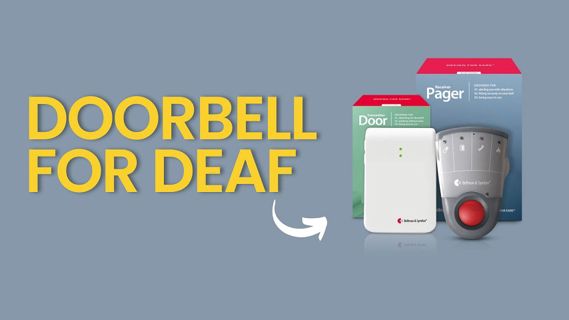
Doorbell for Hard of Hearing: Smart Solutions for Home Accessibility
A ringing doorbell is a sound most of us take for granted, but for individuals who are deaf or hard of hearing, it can often go unnoticed.
Missing visitors, deliveries, or urgent calls can be frustrating and inconvenient. Thankfully, doorbells for people who are hard of hearing offer innovative features tailored to provide accessible and reliable alerts for all.
Let’s explore how these smart devices transform home accessibility and why they are necessary for individuals with hearing impairments.
The Challenges of Traditional Doorbells
Conventional doorbells rely exclusively on sound to alert residents of visitors, leaving those with hearing impairments at a disadvantage. Key issues include:
Limited Accessibility: Standard chimes or bells are ineffective for those unable to hear high-pitched tones.
Missed Alerts: Withnt visitors or deliveries might go unnoticed without alternate noticed
Incompatibility with Hearing Aids: Traditional doorbells often don’t integrate with assistive devices.
These challenges highlight the need for specialized doorbells designed with inclusivity in mind.
Features of Doorbells for the Hard of Hearing
Modern doorbells for deaf people combine technology and design to ensure no one misses a knock at the door. Here are the standout features:
Visual Alerts
Equipped with bright LED lights that flash prominently when the doorbell rings.
Ideal for individuals who rely on visual cues during the day.
Vibrating Alerts
Include portable devices or bed-shakers that vibrate to notify users.
Particularly effective for night-time alerts or when users are away from the door.
Smartphone Integration
Smart doorbells send real-time notifications to smartphones or smartwatches.
Video options allow users to see who’s at the door, adding an extra layer of security.
Customizable Alerts
Users can adjust volume, light intensity, or vibration strength to suit their needs.
Options to create unique notification patterns for different scenarios.
Wireless Connectivity
Easy to install without requiring complex wiring.
Portable receivers can be placed in multiple rooms for better coverage.
Top Benefits of Smart Doorbells for the Hard of Hearing
Investing in a specialized doorbell offers numerous advantages beyond accessibility:
Convenience: Never miss a visitor or delivery, regardless of your location in the house.
Increased Security: Smart video doorbells visually confirm visitors, ensuring added safety.
Inclusivity: Designed specifically for deaf people, these devices promote independence and confidence.
Scalability: Many models integrate with broader smart home systems, allowing users to customize their setup.
Choosing the Right Doorbell for Your Needs
When selecting a doorbell for deaf people who are hard of hearing, consider the following factors:
Type of Alerts
Visual: Best for those who prefer strobe light notifications.
Vibrations: Ideal for users who need alerts while sleeping.
Mobile Integration: Perfect for tech-savvy users wanting remote access.
Range and Coverage
Ensure the doorbell covers the size of your home, especially if you live in a multi-story house.
Power Source
Choose between battery-powered, wired, or rechargeable options based on convenience.
Compatibility
If you have an existing smart home setup, select a model that integrates seamlessly with your devices.
Ease of Installation
Look for user-friendly models that can be set up without professional help.
Installation and Maintenance Tips
Proper installation and maintenance ensure your doorbell functions effectively. Follow these steps:
Choose Strategic Locations: Place receivers in commonly used living rooms and bedrooms.
Test Regularly: Monthly check lights, vibrations, and smartphone alerts to ensure optimal performance.
Replace Batteries Promptly: Low battery signals should be addressed immediately to avoid missed notifications.
Clean the Camera Lens (for video models): Regularly clean for clear visuals of visitors.
By taking these steps, you’ll maximize the utility and lifespan of your device.
Conclusion
A doorbell for people who are hard of hearing isn’t just a gadget—it’s a transformative tool that enhances daily life, ensuring no visitor, delivery, or emergency goes unnoticed. These devices provide reliable solutions for individuals with hearing impairments with advanced features like flashing lights, vibrating alerts, and mobile integration.
Explore many innovative doorbells today and make your home more inclusive, accessible, and secure. After all, everyone deserves the peace of mind that comes with staying connected.
Follow Bellman & Symfon to stay updated on their latest posts!
0 comments
Be the first to comment!
This post is waiting for your feedback.
Share your thoughts and join the conversation.
